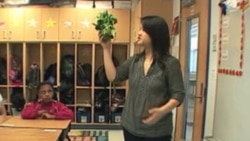This is the VOA Special English Education Report.
About one-fifth of Americans age six to nineteen are considered overweight. To reduce those numbers, some schools are teaching children to make better food choices.
TEACHER AND STUDENT: "So I can have spinach and what, who can give me one combination. Spinach and -- Diego?" "Eggplant?" "Eggplant. Spinach and eggplant. So here is my first combination."
Hannah Chen is teaching the eight and nine year olds in this math class in Washington how to make sets.
HANNAH CHEN: "We just incorporated food into different types of combinations, like with the pizza we had two types of toppings that the kids can provide, and figuring out the different combinations using those toppings."
The EW Stokes Public Charter School has started to include food topics in its third-grade math and English teaching. The school formed a partnership with Seedling Projects, an environmental group in San Francisco, California.
Peter Nalli is a curriculum director for the program called Farm to Desk. He says they are doing this in part to address the issue of childhood obesity.
PETER NALLI: "One of the main components of our program is our belief that if kids are exposed to positive and healthy messaging about food throughout the instructional day, that has the most potential to impact long-term change."
School chef Makeisha Daye says the school buys most of its food from local farms, but the students grow some themselves.
MAKEISHA DAYE: "They are replanting everything now so that we will be using fresh herbs, fresh vegetables straight from our garden. So, the children, they love it."
Teacher Hannah Chen agrees.
HANNAH CHEN: "We have a salad bar at the school, and now the kids love the salad bar. They love the fruits and vegetables. So I think it is making a big difference in their lives."
She says the third graders have also learned to read the sugar and fat content listed on food packages. She says the EW Stokes Public Charter School in Washington plans to expand the Farm to Desk program to other grades next year.
Charter schools get public money but do not have to follow the same rules as traditional public schools.
Many charter schools have specialized areas of study -- like Environmental Charter High School near Los Angeles. Students learn the importance of protecting the environment. Rigo Estrada says he used to be the kind of person who threw trash on the street.
RIGO ESTRADA: "But now that I have seen firsthand videos, I have done beach cleanups, I have helped develop like water-catchment systems, I have taught elementary schools like the importance of water conservation, I know the importance of green and that it actually is a really serious topic."
Students also learn how to prepare a business plan that they can use to help pay for college. They learn from teachers and outside experts like Nancy Gale. She owns an environmentally friendly business that makes handbags.
NANCY GALE: "The idea behind the program is that if these kids see what they can do together and what they can accomplish, that they recognize that their skills extend into the same real world as kids that go to successful private schools."
And that's the VOA Special English Education Report, available online at voaspecialenglish.com and on the VOA Learning English on Facebook. I'm Steve Ember.
___
Contributing: Mike O'Sullivan and June Soh
Watch a video about the Farm to Desk program
Watch a video about Environmental Charter High School




